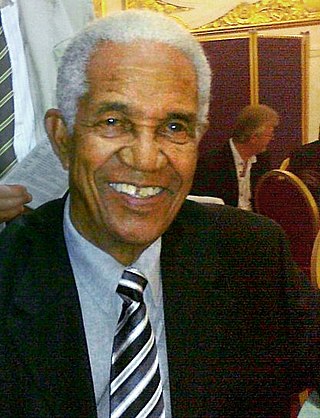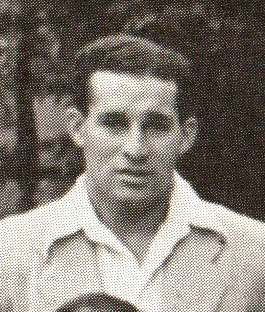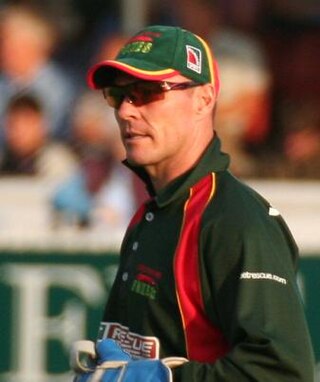
The Right Excellent Sir Garfield St Aubrun Sobers, NH, AO, OCC, also known as Sir Gary or Sir Garry Sobers, is a former Barbadian cricketer who played for the West Indies between 1954 and 1974. A highly skilled bowler, an aggressive batsman and an excellent fielder, he is widely considered to be cricket's greatest ever all-rounder and one of the greatest cricketers of all time.
Alan Philip Eric Knott is a former cricketer who represented England at international level in both Tests and One-Day Internationals (ODI). Knott is widely regarded as one of the most eccentric characters in cricket and as one of the greatest wicket-keepers ever to play the game. He was described by cricket journalist Simon Wilde as "a natural gloveman, beautifully economical in his movements and armed with tremendous powers of concentration".

Leslie Ethelbert George Ames was a wicket-keeper and batsman for the England cricket team and Kent County Cricket Club. In his obituary, Wisden described him as the greatest wicket-keeper-batsman of all time. He is the only wicket-keeper-batsman to score a hundred first-class centuries.
Ridley Detamore Jacobs is a former Antiguan cricketer, who played as a left-handed wicketkeeper batsman for the West Indian cricket team in the late 1990s and early 2000s. He was the first opening batsman to carry his bat in the history of Cricket World Cup and was the fourth batsman to do so in a One Day International. Jacobs also picked up 219 dismissals in tests along with 189 in ODIs, which is second only to Jeff Dujon, for the Windies in his international career.

Sir Everton DeCourcy Weekes, KCMG, GCM, OBE was a cricketer from Barbados. A right-handed batsman, he was known as one of the hardest hitters in world cricket. Weekes holds the record for the most consecutive Test hundreds, with five. Along with Frank Worrell and Clyde Walcott, he formed what was known as "The Three Ws" of the West Indies cricket team. Weekes played in 48 Test matches for the West Indies cricket team from 1948 to 1958. Weekes occasionally donned the wicketkeeping gloves as well. He continued to play first-class cricket until 1964, surpassing 12,000 first-class runs in his final innings. As a coach he was in charge of the Canadian team at the 1979 Cricket World Cup, and he was also a commentator and international match referee.

Rohan Bholalall Kanhai is a Guyanese former cricketer of Indo-Guyanese origin, who represented the West Indies in 79 Test matches. He is widely considered to be one of the best batsmen of the 1960s. Kanhai featured on several great West Indian teams, playing alongside Sir Garfield Sobers, Roy Fredericks, Lance Gibbs, Clive Lloyd, and Alvin Kallicharran among others. C. L. R. James wrote in the New World Journal that Kanhai was "the high peak of West Indian cricketing development", and praised his "adventuresome" attitude. Kanhai was part of the West Indian team that won the inaugural, 1975 Cricket World Cup.
In the 1970 English cricket season, a scheduled South African tour was cancelled for political reasons. As this meant there would be no international cricket in England that season, a Rest of the World team was assembled to play a series of five-day matches against England. At the time, they were played as Test matches, but that status was later revoked by the International Cricket Conference (ICC) and they are now termed unofficial Tests, though still officially first-class matches.
Denesh Ramdin is a former Trinidadian cricketer who plays as a right-handed wicketkeeper-batsman. Ramdin formerly captained the West Indies, Guyana Amazon Warriors, Trinidad and Tobago and the Combined Campuses and Colleges. He was a member of the West Indies team that won both the 2012 T20 World Cup and the 2016 T20 World Cup.

Franz Copeland Murray Alexander OD, known as Gerry Alexander, was a Jamaican cricketer who played 25 Test matches for the West Indies. He was a wicket-keeper who had 90 dismissals in his 25 Test appearances and, though his batting average was around 30 in both Test and first class cricket, his only first-class century came in a Test on the 1960–61 tour of Australia.
John Alexander Jameson is a former English cricketer who played in four Test matches and three One Day Internationals for the England cricket team between 1971 and 1975. Jameson played for Warwickshire County Cricket Club from 1960 until 1976.
David Anthony Murray was a West Indian and Barbadian cricketer who played in nineteen Tests and ten ODIs from 1973 to 1982 as a wicket-keeper.

Paul Andrew Nixon is an English cricket coach and former professional cricketer who played for Leicestershire, England, England A, Marylebone Cricket Club (MCC) and Kent. He is a wicket-keeper and left-handed batsman. Nixon played in twenty international matches for the England cricket team, all within a four-month spell in 2007.
Bourda, or officially Georgetown Cricket Club Ground, is a cricket ground in Georgetown, Guyana, used by the Guyanese cricket team for matches with other nations in the Caribbean as well as some Test matches involving the West Indies. The ground is one of the two cricket stadiums in the South American mainland and is uniquely surrounded by a moat for flood-prevention and drainage reasons.
The West Indian cricket team toured England in 1980, spending virtually the whole of the 1980 English cricket season in England. West Indies also played two matches in Ireland and two in Scotland.
The West Indian cricket team in England in 1963 played 30 first-class matches of which they won 15, lost 2 and drew 13. West Indies played five Tests and won the series against England by three matches to one, with one game drawn.